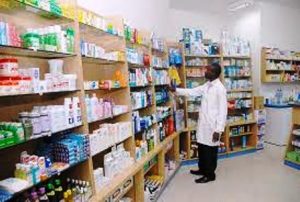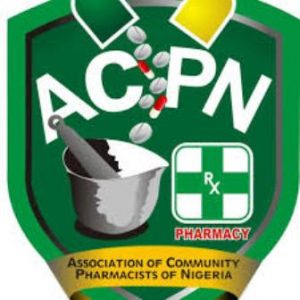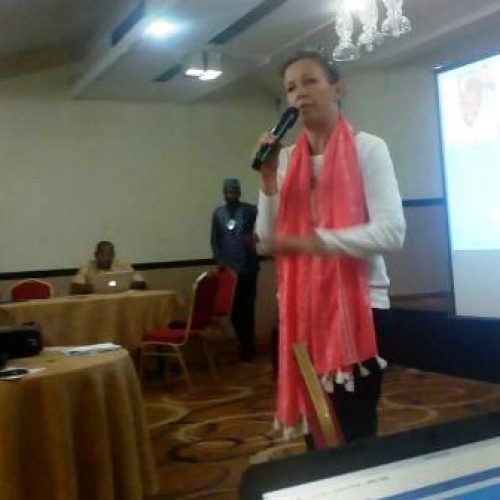ACPN orders closure of Pharmacy shops on Tuesday
The Association of Community Pharmacists of Nigeria (ACPN) has ordered the closure of all pharmacy shops in the country on Tuesday from 12 noon to 2 pm to protest the delay by the President in signing the Pharmacy Council of Nigeria bill 2017 into law.
The Bill has been passed by the two arms of the National Assembly and transmitted to the Presidency for assent. NHO however gathered from impeccable sources that it was sent by the presidency to the Ministry of Health for recommendations which promptly worked on it and submitted an amended version.
The bill was then expected to be returned to the National assembly to tidy up and be re-transmitted to the Presidency for assent. However, NHO learnt that nothing has been heard of the bill till date as it seems to have been stuck in the office of the Chief of Staff.
Now, fearing that the bill which seek to sanitise the nation’s community pharmacy practice, especially the chaotic drug distribution system and the proliferation of fake and substandard drugs all over the country may never become a law, the ACPN has urged its members to shut their pharmacy tomorrow “to tell Nigerians that you are not there with them only to make money, but also as a professional that is concerned about the rising perversion of drug abuse that is ravaging our dear nation.”
The ACPN Director of Information and Communication (DIC), Pharm Olwaseyi Charles, in a message to all Community Practice pharmacists, now trending on the social media, urged members to join the protest and close their pharmacy “to let the world know how you feel about drug abuse.
“You should close your pharmacy tomorrow to tell PCN, NAFDAC – your sole regulators, that you re on their side
“You must close your pharmacy tomorrow to tell PSN president that this is one of the ultimate sacrifices you can pay to support his relentless sweat
“You should close your pharmacy tomorrow to pledge allegiance to the ACPN National Executives and NEC whom you choose to represent you: that you trust them and believe their judgement
“You should close your pharmacy tomorrow to stir confidence in the young pharmacists who believe you are a chief primary health care provider who deserved to be heard,” Oluwaseyi pleaded.
In its letter to the president, ACPN said the delay in signing the bill has complicated the perennial woes of fake as well as falsified drugs in the country, adding that “this should naturally bother” all promoters of Good Pharmacy Practice in Nigeria.
The 3-page letter signed by the National Chairman of the association, Pharm. Samuel Adekola MAW and National Secretary Pharm. (Mrs.) Abosede Idowu further gave details on the significance of the bill which they say is expected to replace the current obsolete Pharmacy Laws derived from the first Pharmacy Ordinance of 1887:
1. The Pharmacy Council of Nigeria (PCN) Bill 2017 is very consistent with similar laws in the Commonwealth League of Nations, where regulatory laws and statutes have become very sacred in keeping pace with the norms and ethos of public health. Examples of such pharmacy regulatory laws in some Commonwealth nations include; General Pharmaceutical Council of Great Britain, Pharmacy Council of Ghana, Tanzania, Kenya, South Africa. Others are National Association of Boards of Pharmacy in United States of America (a wholly Government owned pharmacy regulatory body) and Pharmacy Council of Canada among others. It is a statement of fact that many less endowed African nations have today polished their pharmacy laws to meet global best practices such that the terminal consequences of poor statutes, weak enforcement, and so on which engender easy access to drugs to promote the vicious cycle of drug abuse and misuse, falsified drug syndrome etc. are gradually being eliminated in these climes. This is the same purpose the new Pharmacy Council Bill is intended to achieve.
2. One of the philosophies of the National Drug Policy 2005 is to guarantee that Nigerians have access to safe, efficacious and affordable medicines. This is a cardinal responsibility of every Government to its citizenry. One of the major benefit packages of PCN bill is that it opens a unique window of competence driven service rendition at all levels. The new Satellite Pharmacy concept gives us the prospects of additional pharmaceutical premises in hundreds of thousand range manned by registered pharmacist. The Bill provides that any pharmacist who has over ten (10) year post-qualification experience can own a satellite pharmacy not withstanding his primary practice option. What this does is that professional service points in pharmacy will increase from about five thousand (5000) we currently have to over one hundred thousand (100,000) in Nigeria. These satellite Pharmacies in turn have mandate to provide oversight in a manner of hub and spoke model over the Patent and Proprietary Medicines Vendors thereby improving their regulation. The enforcement of sales of medicines in only registered pharmacies and patent medicines stores by the PCN is the only way to permanently redress the menace of drug abuse and falsified drug syndrome in Nigeria. This has been prescribed by the Poison and Pharmacy Act.
3. The PCN Bill 2017 clearly prohibits sale of drugs in unauthorized places such as open drug markets, this in essence is in tandem with the National Drug Distribution Guidelines (NDDG) which is the official Government tool structured to impose decorum in the unwieldy drug distribution channels which Nigeria currently contends with. Today as it stands Government moves to replace the unlawful open market structures with Coordinated Wholesale Centers (CWC) need to be grounded in lawful templates which the PCN bill guarantees. The responsibilities of the critical stakeholders and in particular our regulators like PCN, NAFDAC, NDLEA as well as police will automatically be enhanced once all the necessary reforms are formalized.
4. Pharmacy Laws are laced with very substantial antiquity because the first Pharmacy Ordinance was enacted in 1887. This has been tinkered with severally through a series of metamorphosis in evolving Acts till the modern-day variants like the PCN Cap 17 LFN 2004 and the PPA Cap 535 LFN 1990. The consequences of these acts of negligence remains the vulnerability of the PCN and Federal Government and the Honorable Minister of Health to unending litigations which reduces the efficiency of the PCN in carrying out its statutory mandate.
5. The PCN bill in question has also removed all ambiguities with regards to offences and relevant commensurate sanctions applicable to all players. This is particularly significant because owners of unregistered premises, those who sell products they are not legally licensed to sell and those who violate the condition precedence attached to their licensure will better appreciate the consequences of their unlawful endeavors and acts.
6. Flowing directly from above, the PCN bill particularly compels PHARMACISTS to show more responsibility in their professional practice. The need for discipline is showcased at greater heights because the Disciplinary Tribunal is geared to wield the big stick on erring pharmacists and pharmaceutical premises in the best interest of consumers of health.
7. The PCN bill also has the unique feature of unhindered empowerment as all professionals and their cadres of practice are registered as distinct legal entities. The PCN bill will therefore feature for public consumption a gazette of registered pharmacists, pharmacy technicians, registered retail, wholesale, importation, manufacturing, CWC and satellite pharmacies. The peculiar registration format will also highlight all patent and Proprietary medicines vendors license holders in Nigeria for proper scrutiny.
8. The PCN bill has also taken care of effective management of resources by presenting a robust yet broad spectrum structure that can work maximally in the interest of the pharma-sector to enhance service delivery at all times.
The association urged President Buhari t to “heed this clarion call” to engender a new agenda of productivity, professionalism, self-sufficiency in local production and regulatory excellence in the pharma-sector.
“These achievements will change the narratives and place the pharma-sector in good stead to contribute to National Gross Domestic Products (GDP),” it said.
About author
You might also like
Firm offers free hypertension screening for Abuja residents
A Nigerian pharmaceutical company, Neimeth international pharmaceuticals plc, plans to conduct free hypertension screening for residents of the Federal Capital Territory, Abuja. The exercise will also include distribution of free
Genetics professor says Sickle Cell is death sentence
Prof. Otoikhian on the programme Courtesy: TVC • “It’s a curse,” he tells TV viewers on World Sickle Cell Day In a frank but brutal manner, a professor of genetics,
North East needs $1bn to address humanitarian needs in 2018 – UNOCHA
Humanitarian interventions in reconstructing the devastations in North East Nigeria will require at least $1bn in 2018 to address. The fund is needed to meet some of the needs of










0 Comments
No Comments Yet!
You can be first to comment this post!